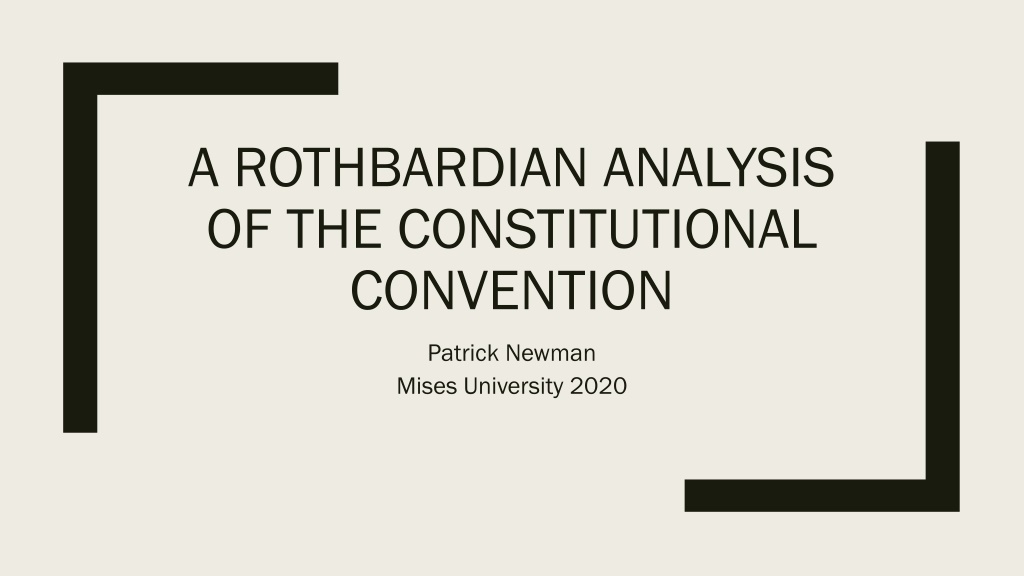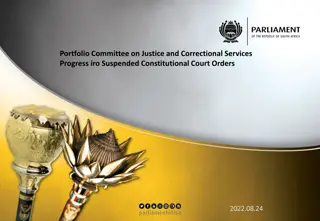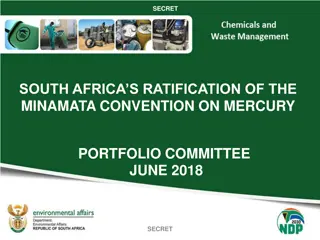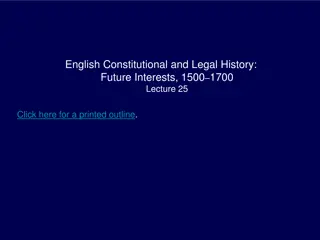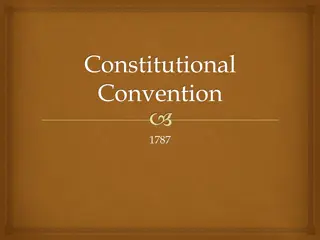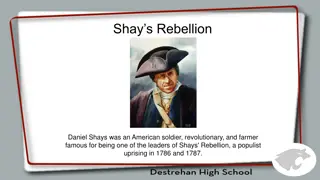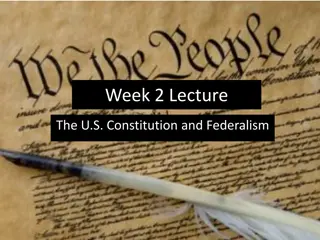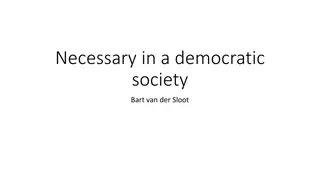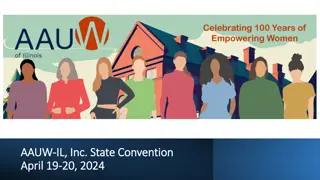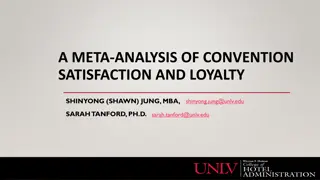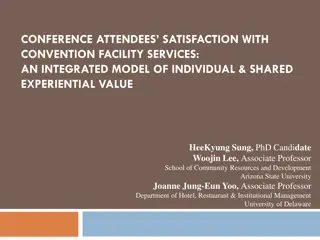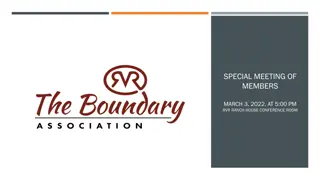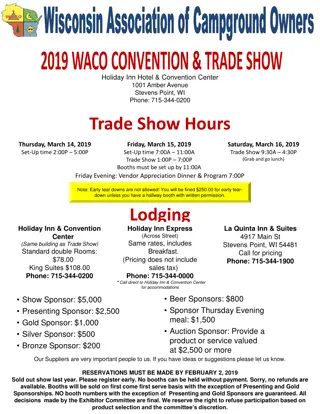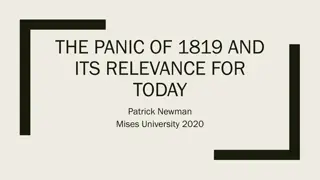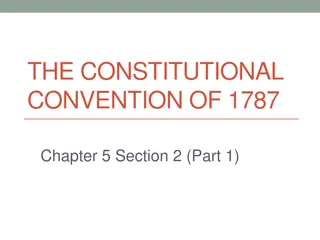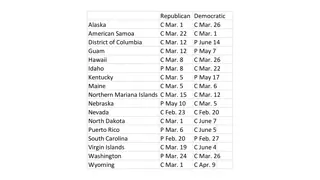Cronyism and Special Interests: A Rothbardian Analysis of the Constitutional Convention
Explore how the U.S. Constitution was influenced by cronyism and special interests through the lens of Murray Rothbard's analysis. The presentation delves into how Federalists at the 1787 Constitutional Convention secured privileges, passed special interest legislation, and shaped key clauses to benefit specific groups, rather than the general public interest.
Download Presentation

Please find below an Image/Link to download the presentation.
The content on the website is provided AS IS for your information and personal use only. It may not be sold, licensed, or shared on other websites without obtaining consent from the author. Download presentation by click this link. If you encounter any issues during the download, it is possible that the publisher has removed the file from their server.
E N D
Presentation Transcript
A ROTHBARDIAN ANALYSIS OF THE CONSTITUTIONAL CONVENTION Patrick Newman Mises University 2020
What is this presentation about, and why should I care? Relates to Murray Rothbard s Conceived in Liberty, Volume V: The New Republic, 1784-1791 and my forthcoming book, Liberty versus Power: A History of Cronyism in the United States, 1607-1849 (2021?) U.S. Constitution is a thoroughly crony document, full of special privileges 1. Federalists pushed for a constitutional convention in 1787 to secure privileges 2. Federalists succeeded at the convention 3. Federalists passed special interest legislation in early 1790s under the aegis of Secretary of the Treasury Alexander Hamilton I will concentrate on government debt, banking, tariffs, and land
Rothbard on the crony Constitutional Convention Buchanan and Tullock The Calculus of Consent (1962) it was voluntary and (sorta) unanimous! The Myth of Neutral Taxation (1981, p.482): Buchanan and public-choice theorists argue that the all-voluntarily-forcing-themselves process actually takes place at the basic constitutional level. But again there is no evidence for this whatever. . . .
Rothbard on the crony Constitutional Convention (1981, p.482) If they have the American Constitution in mind, then should realize that the Constitution was put across wishes of the majority of the public and that makers makers were were interested interested not not in in general but but in in pushing pushing through through measures measures protective tariffs, opening up of export markets, repayment of public debt at far above market expanded bank credit for privileged groups, public for for one one set set of of people people at at the the expense expense of of they against the the for the Constitution Constitution benefit of of all, general rules rules for the benefit all, price, works another another.
The Constitutional Convention of 1787 Few Antifederalists, mostly hardcore Federalists related to merchant prince Robert Morris of PA attended Gouverneur Morris and James Wilson of Pennsylvania Alexander Hamilton of New York James Madison and George Washington of Virginia Charles Pinckney and Charles Cotesworth Pinckney of South Carolina Federalists secure big three vague clauses with little debate Supremacy, general welfare, necessary and proper clauses Federalists knew the big three clauses could always perform the heavy lifting and do the dirty work, explicit enumeration would raise too much controversy during ratification
First came the debt speculators During the Revolutionary War (1775-1783), federal and state governments paid soldiers with debt securities Subsequently sold for cash at highly depreciated rates to wealthy speculators affiliated with Robert Morris Get the Articles of Confederation to acquire taxing power and assume all the debt at face value Problem: AOC required an amendment for taxes (unanimity), and Rhode Island blocked Tariff of 1781, New York blocked Tariff of 1783
Get the Constitutional Convention to assume the debt Congress acquires taxing power; only a simple congressional majority needed (no state legislatures and no unanimity) Taxing power also explicitly linked with payment of the public debt Madison and Hamilton ensured the Constitution assume the Confederation s debt and say nothing about state debts to provoke less opposition during ratification
Get Congress to assume the debt Secretary of the Treasury Hamilton s Report Relative to a Provision for the Support of Public Credit (January 1790) Congress should assume roughly $80 million of federal and state debts Irving Brant (1950): bluntly stated, Hamilton s precept was: Bind the rich to the government by self-interest.
Get Congress to assume the debt (cont.) Since 1789, Senator Robert Morris and other affiliated speculators increasingly gobbled up debt Including Assistant Secretary of the Treasury William Duer! 80% of federal debt held by wealthy northern speculators 78 individuals bought up 31% of Virginia, North Carolina, and South Carolina s debt (8 men bought up half of this) Congress passed debt assumption in 1790 By 1795, 5% of debt holders (>$10,000) owned 65% of debt, .25% of debt holders (>$100,000) owned 30% of debt Debt assumption acted as a massive sectional redistribution racket (funded by regressive tariffs and internal taxes (e.g. whiskey)
Next came the bankers During the Revolutionary War, at the behest of financier Robert Morris, Congress chartered the Bank of North America in 1781 (BONA also acquired a Pennsylvania state charter) But, by 1783 BONA lost its federal charter and in 1785 Pennsylvania weakened its state charter Pennsylvania state also printing its own money, this is competition!
Get Constitutional Convention to deliver banking privileges Constitutional Convention initially decided to explicitly empower Congress with ability to print money, but struck it out Gouverneur Morris and James Madison: now Constitution just restricts printing to responsible minister and safe emissions Robert Morris and Gouverneur Morris led effort to get Constitution to prohibit states from printing money Of Pennsylvania s eight delegates, seven owned stock in the Bank of North America Constitution said nothing about federal government s power to print money (implied) but explicitly prohibited states from printing money Vague clauses can do the dirty work!
Get Constitutional Convention to deliver banking privileges James Madison proposed giving Congress the explicit power to charter corporations, convention shot it down James Wilson thought such ability already included in the power to regulate trade. Morris thought the general welfare clause authorized Congress to grant exclusive privileges to trading companies.
Get Congress to charter a central bank Secretary of the Treasury Hamilton s Report on a National Bank (12/90) Referred to a Senate Committee (Senator Robert Morris on committee, 3/5 members own stock in state banks) February 1791, Congress charters Bank of the United States Twenty year monopoly over interstate banking (Philadelphia based) $10 million capitalization (federal government owns 20%, private ownership can be purchased with specie or government debt) Treasury stores deposits at bank (massive subsidy)
Get Congress to charter a central bank (cont.) 50% of congressmen who voted for bank bill purchased stock in the institution Ownership concentrated in Boston, New York City, Philadelphia, and Charleston Government directors mostly associated with Senator Robert Morris Thomas Willing, Morris business associate and former president of Bank of North America, becomes president of the Bank of the United States! SBUS lends mainly to federal government and large Federalist businesses, land speculators, debt speculators, merchants, etc.
Then came the manufacturers Under the Articles of Confederation, northern manufacturers could not secure high interstate tariffs South supported low tariffs, also interstate competition Interstate tariffs around 5% (over exaggerate New York) They had no success on the federal level securing a tariff (recall the failed tariffs of 1781 and 1783) Northern merchants experienced similar difficulties with navigation acts (separate story)
Get Constitutional Convention to deliver manufacturing privileges Convention outlawed interstate tariffs and only required a simple congressional majority (51%) for tariffs Nathaniel Gorham of Massachusetts: If the Government is to be so fettered as to be unable to relieve the Eastern states, what motive can they have to join it. Some southern delegates wanted supermajority (two-thirds) for tariffs and navigation acts Northern delegates won over enough southerners by sanctioning slave trade until 1808
Get Congress to pass tariffs Congressman Madison pushes for Tariff Act of July 1789 North wanted high tariffs, South wanted low tariffs, Madison sides with North No recorded vote, probably simple majority 12.5% average tariff rate With SOT Hamilton s prodding, Federalists raise tariffs again in 1792, by 1800 rates around 30%
Finally, the land speculators got what they wanted Land speculators acquire grants of unappropriated land from state governments, turn around and sell to settlers at a profit Crony, land unowned until homesteading Speculators want to prevent state governments from rescinding land grants (Similar to preventing Pennsylvania s weakening of the BONA s charter)
Get Constitutional Convention to protect land grants James Wilson (attorney for Robert Morris, a land speculator) and James Madison secure contract clause in Constitution They wanted to prevent state legislatures from interfering with speculative land grants
Get state legislature to dole out land grants under Constitution Yazoo land grant (Alabama and Mississippi area) 1794, four land speculator companies bribe Georgia legislature into selling 35 million acres of land for a paltry $500,000 (1.5 cents an acre) Senator Robert Morris and Federalist Supreme Court Justice James Wilson involved in the land speculation Land companies quickly resold (e.g., Mississippi Company sold part of land for $1,138,000, original cost $155,000!) Georgians irate, throw out state congressmen, new legislature in 1796 repeals land grants. What do the land speculators do?
Get Supreme Court to protect land grants with contract clause 1797, Alexander Hamilton predicted Supreme Court would protect land grants using contract clause Just like what lawyer (and eventual Supreme Court Justice) James Wilson Just like what lawyer (and eventual Supreme Court Justice) James Wilson intended! intended! Panic of 1797 crushes Morris and Wilson Eventually, case goes to John Marshall Court (a Virginia land speculator) ruled in favor of a partial bailout to Yazoo claimants in 1810 (Fletcher v. Peck) Corrupt Marshall also wants to protect his own pocket (1813 Fairfax s Devisee v. Hunter s Lessee and 1816 Martin v. Hunter s Lessee)
Curtis Nettels (1962, p.122) on the Federalist Program [The Federalist program] did not give birth to many large new fortunes; its principal beneficiaries were men of substance who had become affluent before 1789. Their enlarged wealth enhanced their influence in government and society and pointed to an age of big business in which captains of finance would occupy the seats of the mighty.
Conclusion In 1787, Federalists pushed for a constitutional convention to secure special privileges Federalists secure privileges in U.S. Constitution In early 1790s, Federalists get Congress to enact said privileges using U.S. Constitution You should read my book when it comes out!
